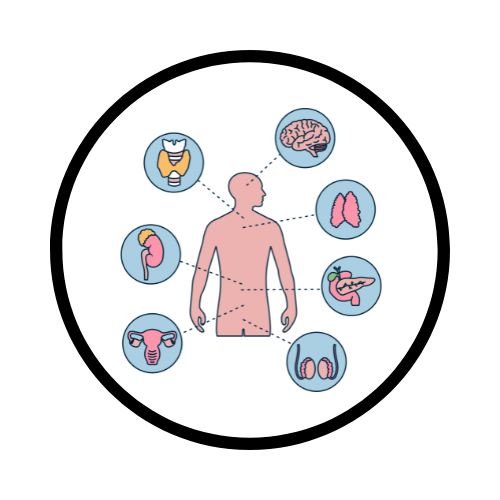Introduction to the Endocrine System
Welcome! Let's dive into the incredible world of the endocrine system, a crucial part of your body's overall functioning. This system is made up of a collection of glands that produce and secrete hormones, which are chemical messengers that travel through your bloodstream to organs and tissues. These hormones play significant roles in regulating various bodily processes, ensuring everything runs smoothly.
At its core, the endocrine system helps control several vital functions. These include metabolism, growth and development, tissue function, sexual function, reproduction, sleep, and mood, among others. Hormones act as messengers, telling different parts of the body how and when to perform specific tasks. Imagine it as a well-coordinated orchestra where each instrument needs to play its part at the right time for the music to sound harmonious.
Glands such as the pituitary, thyroid, and adrenal glands are key players in this system. Each gland has a unique role and produces specific hormones to regulate different functions. For instance, the thyroid gland in your neck regulates metabolism and energy levels. Meanwhile, the adrenal glands, located above your kidneys, help manage stress responses and blood pressure.
One fascinating aspect of the endocrine system is its feedback mechanisms. When a hormone's level rises or falls beyond a certain threshold, it triggers a response to either reduce or increase production, maintaining a balanced state known as homeostasis. This delicate balance is vital for optimal health and functioning.
The interactions between different glands are also important. The hypothalamus in the brain, for instance, plays a key role in connecting the nervous system to the endocrine system via the pituitary gland. This interaction helps regulate vital functions like temperature, thirst, hunger, and emotional activity.
Your endocrine system is always working behind the scenes to ensure your body responds appropriately to internal and external changes. Whether you're facing a stressful situation, recovering from an injury, or simply digesting a meal, your hormones are at work, making necessary adjustments to keep you in balance.
Understanding how the endocrine system works can empower you to make informed decisions about your health. Recognizing the importance of this system can help you appreciate how interconnected your body’s functions are and how essential it is to support them with healthy habits.
Key Organs of the Endocrine System
At the heart of the endocrine system are its major glands, each playing a unique role in hormone production and regulation. Let's take a closer look at some of these key players:
1. Pituitary Gland: Often referred to as the "master gland," the pituitary gland governs other endocrine glands and influences growth, metabolism, and regeneration. It secretes hormones that regulate various functions, including stress responses and reproduction. This small gland, located at the base of the brain, plays a vital role in maintaining the body's equilibrium.
2. Thyroid Gland: Nestled in the neck, the thyroid gland is essential for regulating metabolism. It produces hormones that control how quickly the body uses energy and responds to other hormones. This gland also aids in maintaining body temperature and supporting bone health, making it crucial for overall vitality.
3. Adrenal Glands: Situated above the kidneys, the adrenal glands produce hormones that help regulate metabolism, immune response, blood pressure, and the body’s response to stress. They are essential for the "fight or flight" response, enabling the body to react swiftly to emergencies.
4. Pancreas: While the pancreas is well-known for its role in digestion, it also has a critical endocrine function. It produces insulin and glucagon, which regulate blood sugar levels. This balance is vital for energy management and metabolic processes, ensuring that cells receive the fuel they need to function properly.
5. Hypothalamus: The hypothalamus is a small yet powerful part of the brain that links the nervous system to the endocrine system. It controls the pituitary gland by releasing hormones that either stimulate or inhibit hormone production. This regulation is fundamental for processes such as temperature control, thirst, hunger, and emotional activity.
6. Parathyroid Glands: Located behind the thyroid gland, these small glands play a key role in maintaining calcium levels in the blood and bone metabolism. They produce parathyroid hormone (PTH), which helps regulate calcium and phosphorus levels, crucial for healthy bones and teeth.
7. Pineal Gland: This tiny gland in the brain is responsible for producing melatonin, a hormone that regulates sleep-wake cycles. It helps manage the body's internal clock, influencing sleep patterns and seasonal rhythms.
8. Reproductive Glands: In females, the ovaries produce estrogen and progesterone, hormones essential for reproductive health, menstrual cycle regulation, and pregnancy. In males, the testes produce testosterone, which is crucial for sperm production, muscle mass, and overall male reproductive health.
9. Kidneys: Beyond their well-known role in filtering blood and maintaining fluid balance, the kidneys are also important endocrine organs. They produce hormones such as erythropoietin (EPO), which stimulates red blood cell production, and renin, which helps regulate blood pressure. Additionally, the kidneys convert vitamin D into its active form, supporting calcium balance and bone health. Their hormonal contributions are vital for maintaining oxygen levels, blood pressure, and mineral balance throughout the body.
10. Liver: Although not traditionally labeled as an endocrine gland, the liver is an essential contributor to hormonal balance and metabolic regulation. It activates, deactivates, and breaks down hormones such as insulin, thyroid hormones, and steroid hormones like estrogen and cortisol. Additionally, the liver produces hormone-like substances, including insulin-like growth factor 1 (IGF-1), which supports growth and cellular repair. Its role in processing and regulating hormones makes it indispensable to the overall function and harmony of the endocrine system.
Each of these glands contributes to the endocrine system's harmonious function, ensuring that your body responds aptly to internal and external changes. By understanding the specific roles of these glands, you can better appreciate the intricate balance maintained within your body for optimal health.
How the Endocrine System Functions
The endocrine system operates through a sophisticated network of glands that release hormones directly into the bloodstream. These hormones, acting as chemical messengers, travel to various organs and tissues to influence a wide array of bodily functions, from growth and development to mood regulation and metabolic processes.
One of the standout features of the endocrine system is its use of feedback loops to regulate hormone levels. Think of it as a thermostat for your body. When hormone levels deviate from the desired range, signals are sent to adjust production accordingly. For instance, if blood sugar levels rise, the pancreas secretes insulin to help cells absorb glucose, thereby lowering blood sugar levels. Conversely, when blood sugar levels fall, the pancreas releases glucagon to raise them. This constant adjustment helps maintain homeostasis, ensuring your body's internal environment remains stable.
The hypothalamus plays a pivotal role in this regulation by linking the nervous system to the endocrine system. It monitors various bodily functions and releases hormones that control the pituitary gland, which in turn, influences other glands like the thyroid, adrenal glands, and reproductive organs. This chain of command is crucial for coordinating complex processes such as stress response, growth, and reproductive cycles.
Take the adrenal glands as another example. Located above the kidneys, they produce cortisol, a hormone that helps manage stress. When you're in a stressful situation, the hypothalamus triggers the pituitary gland to signal the adrenal glands to release cortisol. This hormone prepares your body to handle the situation by increasing blood sugar levels and enhancing brain function. Once the stressor is gone, feedback mechanisms kick in to lower cortisol levels, preventing long-term damage from chronic stress.
Hormonal balance is also essential for mental health. Hormones like serotonin and dopamine, which are influenced by the endocrine system, play significant roles in regulating mood and emotional well-being. Imbalances can lead to issues like depression or anxiety, highlighting the importance of a well-functioning endocrine system.
Sleep is another area where the endocrine system exerts significant influence. The pineal gland produces melatonin, a hormone that regulates sleep-wake cycles. When it gets dark, melatonin levels rise, signaling to your body that it's time to sleep. Disruptions in melatonin production can lead to sleep disorders, affecting overall health.
Physical activity and diet can significantly impact hormonal balance. Regular exercise helps regulate hormones like insulin and cortisol, while a balanced diet provides the necessary nutrients for hormone production and function. Poor lifestyle choices, on the other hand, can disrupt this delicate balance, leading to various health issues.
Understanding these mechanisms empowers you to make informed decisions about your lifestyle and health, ensuring your endocrine system functions optimally to support overall well-being.
Interactions Among Endocrine Organs
The endocrine organs form an interconnected network, working together to maintain the body’s balance and respond to various needs. One of the most fascinating aspects of this system is the way different glands communicate and coordinate their actions through hormone signaling.
For example, the hypothalamus in the brain serves as a control center that sends out signals to the pituitary gland. The pituitary gland, often referred to as the "master gland," then releases hormones that influence other glands, such as the thyroid, adrenal glands, and reproductive organs. This chain of command ensures that hormone levels are finely tuned and responsive to the body's requirements.
The thyroid gland, for instance, produces hormones that regulate metabolism. When the body needs more energy, the hypothalamus signals the pituitary gland to release thyroid-stimulating hormone (TSH). This, in turn, prompts the thyroid to release its hormones, which accelerate metabolic processes. Conversely, if the body needs to slow down, the hypothalamus will reduce the signal, causing the thyroid to produce fewer hormones.
The adrenal glands also showcase the importance of endocrine interactions. In response to stress, the hypothalamus sends a signal to the pituitary gland, which releases adrenocorticotropic hormone (ACTH). This hormone travels to the adrenal glands, prompting them to produce cortisol, a crucial hormone for managing stress. This coordinated effort helps the body respond to stressful situations effectively, adjusting blood pressure and energy levels as needed.
Reproductive health is another area where endocrine interactions are vital. In females, the hypothalamus and pituitary gland work together to regulate the menstrual cycle. The hypothalamus releases gonadotropin-releasing hormone (GnRH), which prompts the pituitary gland to release follicle-stimulating hormone (FSH) and luteinizing hormone (LH). These hormones travel to the ovaries, stimulating the production of estrogen and progesterone, which are essential for reproductive health.
In males, a similar interaction occurs. The hypothalamus releases GnRH, prompting the pituitary gland to release FSH and LH, which then stimulate the testes to produce testosterone. This hormone is crucial for sperm production, muscle mass, and overall male reproductive health.
In addition to these glands, the liver plays a crucial role in supporting the endocrine system. While not traditionally classified as an endocrine gland, the liver produces, activates, and breaks down various hormones, acting as a vital regulator of hormonal balance. It converts inactive thyroid hormones into their active form, processes insulin and glucagon to help maintain blood sugar levels, and metabolizes steroid hormones like estrogen, progesterone, and cortisol. The liver also produces hormone-like substances, such as insulin-like growth factor 1 (IGF-1), which supports growth and tissue repair. Without the liver’s essential contributions, hormonal signals would not be properly balanced, leading to widespread effects on metabolism, energy levels, and overall health.
These complex interactions demonstrate how no gland works in isolation. They rely on each other to maintain a balanced internal environment, ensuring that all bodily functions are carried out efficiently. By understanding these interactions, we can better appreciate the intricate network that keeps our bodies running smoothly.
Supporting a Healthy Endocrine System
Maintaining a healthy endocrine system is key to your overall wellness. Here are some practical tips to keep your endocrine system functioning smoothly:
1. Eat a Balanced Diet: Consuming a variety of whole foods, such as fruits, vegetables, lean proteins, and healthy fats, can provide the nutrients needed for hormone production and regulation. Avoid excessive intake of sugars and processed foods, as they can disrupt hormonal balance and lead to health issues.
2. Exercise Regularly: Engaging in regular physical activity helps regulate hormone levels and enhances mood. Aim for a combination of cardiovascular exercises, strength training, and flexibility workouts to support your endocrine system. Activities like walking, jogging, yoga, and resistance training can make a positive difference.
3. Manage Stress: Chronic stress can significantly affect hormone levels, leading to various health problems. Incorporate stress-reducing practices such as meditation, deep breathing exercises, or mindfulness into your daily routine. Finding time for hobbies and socializing with loved ones can also help manage stress.
4. Get Enough Sleep: Quality sleep is essential for hormone regulation. Aim for 7-9 hours of uninterrupted sleep each night to ensure your endocrine system functions optimally. Establishing a regular sleep schedule and creating a relaxing bedtime routine can improve sleep quality.
5. Stay Hydrated: Proper hydration is crucial for all bodily functions, including hormone production and regulation. Aim to drink at least 8 glasses of water daily and adjust your intake based on activity levels and environmental conditions.
6. Avoid Endocrine Disruptors: Limit exposure to chemicals that can interfere with hormone function, such as certain pesticides, plastics, and personal care products. Opt for natural or organic products when possible and store food in glass containers instead of plastic.
7. Monitor Weight: Maintaining a healthy weight is important for hormonal balance. Both excessive weight gain and weight loss can disrupt hormone levels. Focus on a balanced diet and regular exercise to achieve and maintain a healthy weight.
8. Seek Medical Advice: Regular medical check-ups can help identify any potential issues with your endocrine system early on. If you experience symptoms like unexplained fatigue, significant weight changes, or mood swings, consult your healthcare provider for guidance.
By integrating these healthy habits into your daily routine, you can support your endocrine system's health and contribute to your overall well-being. Understanding and caring for this vital system is a step toward a healthier, more balanced life.








